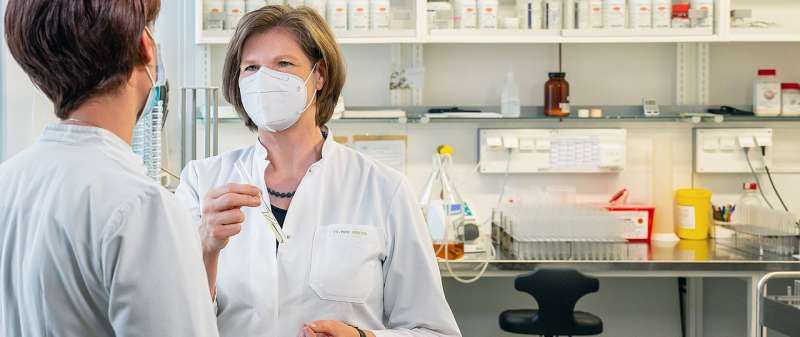Three COVID-19 exposures needed for broad immunity

The immune system develops a high-quality antibody response after three encounters with the coronavirus spike protein. These antibodies are also capable of neutralizing omicron efficiently. This applies to people who are triple-vaccinated, to those having recovered and then received two vaccinations and to double-vaccinated individuals who have experienced a breakthrough infection. These are results of a study which tracked the antibodies of vaccinated and recovered individuals for two years.
Since the beginning of the COVID-19 pandemic, SARS-CoV-2 has continued to evolve, with new variants of concern (VoCs) spreading rapidly. Highly contagious and partially capable of evading the immune response, omicron has become the dominant variant in most countries.
Answers to the question how the immune systems can be "educated" to battle omicron and other immune escape variants of the virus are provided by a team led by Prof. Ulrike Protzer, Director of the Institute of Virology at the Technical University of Munich (TUM) and Helmholtz Munich, Percy Knolle, Professor of Molecular Immunology at TUM, and Prof. Oliver T. Keppler (Max von Pettenkofer Institute and Gene Center Munich at LMU). As they report in Nature Medicine, a total of three exposures to the viral spike protein leads to production of virus neutralizing antibodies not only in high quantity, but also high quality. These high-quality antibodies bind to the viral spike protein more vigorously and are also capable of effectively fighting the omicron variant. This applies to triple-vaccinated people, to people who have recovered from COVID-19 and then had two vaccinations, and to double-vaccinated people who then had a breakthrough infection.
Since the beginning of the pandemic, voluntary participants from the staff at TUM's university hospital Klinikum rechts der Isar at risk of infection participated in the study and were regularly tested. The researchers identified individuals who had contracted SARS-CoV-2 during the first wave of the pandemic in spring 2020, and compared them to a second group of people who had not been infected. Subsequently, both groups were offered vaccination with the mRNA-based COVID-19 vaccine from BioNTech/Pfizer and were monitored for almost two years. The cohort comprised 98 recovered persons and 73 persons without prior infection.
"This longitudinal study is particularly exciting, because we can follow how the immune response evolves over time against the virus and after vaccination" says Prof. Knolle, pointing to a study by the team, which has just appeared in Nature Communications. In the new study the team now defined several parameters in the blood of study participants: the concentration of antibodies to the viral spike protein, the binding strength of these antibodies, and their ability to neutralize infection of SARS-CoV-2 variants in cell culture. For estimating the extent of protective immunity, the latter two parameters are particularly important. The study revealed that the ability of the immune system to neutralize the virus correlates only weakly with the antibody titer. Rather, it was critical how effectively these antibodies bind to the virus and thus disable infection.
As predicted from its many mutations, omicron exhibited the most pronounced evasion from neutralizing antibodies compared to all other viral variants tested. "For omicron, you need considerably more and better antibodies to prevent infection" points out Prof. Keppler. The researchers developed a new virus neutralization test, which allowed them to analyze antibodies in many serum samples and different variants of the virus at high throughput rates. Prof. Protzer adds: "A new finding of our study is that people require three separate exposures to the spike protein to build up high-level neutralizing activity against all viral variants, including omicron."
As the scientists report, various constellations are possible for these three spike encounters. Triple-vaccinated people without prior SARS-CoV-2 infection had almost the same titer and quality of neutralizing antibodies against omicron as vaccinated convalescents or people who had a breakthrough infection with delta or omicron. Prof. Keppler: "In all cases, the neutralization activity reached similarly high levels and this was paralleled by an increased binding strength of the antibodies." Prof. Protzer and Prof. Knolle agree: "The immunity built up or strengthened by means of vaccination is key to effective protection against future variants of the virus. A recent breakthrough infection—as irritating and undesirable as it is—has in fact the same effect as an additional vaccination on this important arm of the immune system."
More information: Paul R. Wratil et al, Three exposures to the spike protein of SARS-CoV-2 by either infection or vaccination elicit superior neutralizing immunity to all variants of concern, Nature Medicine (2022). DOI: 10.1038/s41591-022-01715-4
Nina Koerber et al, Dynamics of spike-and nucleocapsid specific immunity during long-term follow-up and vaccination of SARS-CoV-2 convalescents, Nature Communications (2022). DOI: 10.1038/s41467-021-27649-y



















